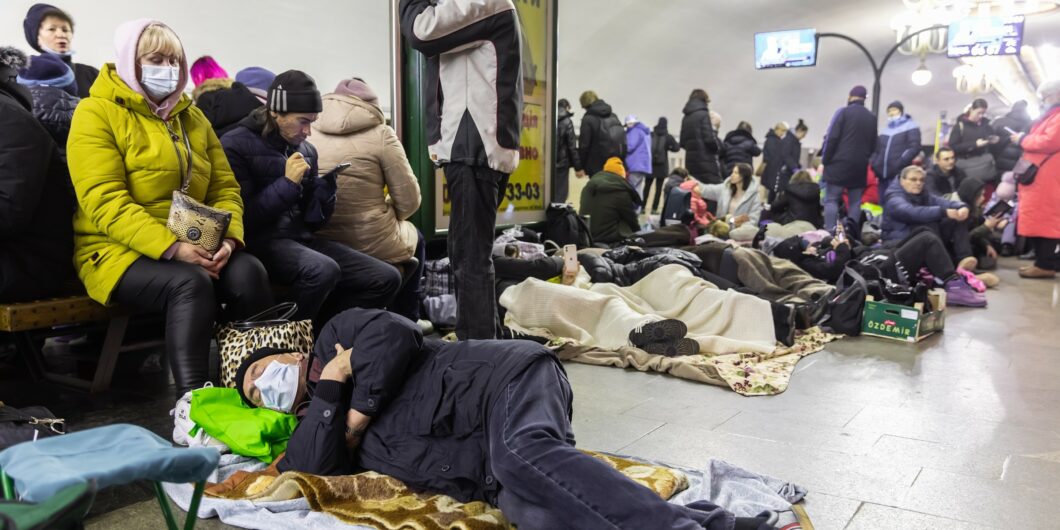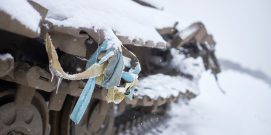Putin is using a terrible history in a disingenuous way to feed his obsession with "Ukrainian Nazis."
Horror and Heroism in the Battle of Kyiv
In the late 1950s, in a small town in Western Ukraine, nestled in the shadow of the picturesque Carpathian Mountains, a little girl went uphill with a pail each day to buy milk from the Hutsul shepherds. Food was scarce, but at least her family, like many others around, grew potatoes and bought milk. A decade or so later, the girl, now a young woman, went to a conservatory in Ivano-Frankivsk, pursuing her dream of becoming a concert pianist. A few years after that, she was accepted to the prestigious Leningrad Conservatory. In Leningrad (now St. Petersburg again), she got married, had kids, and never moved back home. Instead, shortly before the Soviet Union collapsed, this family first immigrated to Israel, and then the US.
The young woman in the story is my mom. The Russian invasion of Ukraine in February 2022 brought forth powerful emotions for me and other immigrants with similar backgrounds to mine. It felt like a glimpse of an alternate life: what if our families had stayed in their ancestors’ hometowns? Or what would our lives have been like had my parents decided to stay put in Russia in 1991, instead of immigrating?
Perhaps like everyone else in Russia, we would have spent this March trying to decide whether to elect a relentless dictator for a fifth term in a sham election, or bravely risk our lives and freedom by voting for someone else. I suppose there was also a third, no less risky, option: boycotting the election altogether. Freedom, the fate of people like Navalny reminds us, is a precarious thing, bought at a heavy price.
As I wrote in late February: “What is it like to live in an authoritarian state? It is to always be afraid. It makes sense that it was an American who said, ‘The only thing to fear is fear itself.’ No one who has lived in Russia would ever say that.” Perhaps it is no surprise that amid rising repression, Putin’s “victory” for a fifth term came with his largest margin yet. Good for him, I guess. Most Russians are just going to stay “quieter than water, lower than grass” as notes the folk saying, which another immigrant writer, Olga Zilberbourg, used in her own reflection on growing up afraid.
But Ukrainian journalist Illia Ponomarenko has never lived in an authoritarian state. Born right after the collapse of the Soviet Union in free Ukraine, he has lived a remarkably Western life, by his own admission and description. He grew up in the village of Volnovakha, not far from Mariupol, and then attended university in Mariupol before moving to Kyiv to begin a career in journalism. In his new memoir, I Will Show You How It Was: The Story of Wartime Kyiv, Ponomarenko presents an insider’s perspective of living and reporting in wartime Kyiv during the first few months of the 2022 invasion. It is, he emphasizes, not only his own story but that of millions of people who together chose to resist to keep their freedom. It is also a tale of a war that makes no sense in the twenty-first century: “How did we come to this place, in our age of Netflix, AI chatbots, and food-delivery apps?” Indeed, this is “the first TikTok war.”
Ponomarenko’s story begins in the final months of 2021 when multiple reports emerged that Putin was planning an attack on Ukraine. Repeated diplomatic failures follow as Biden and multiple NATO officials keep asking Putin not to invade Ukraine, and Putin keeps insisting that no invasion is afoot—not ruling out a defensive war to protect Russia, of course. All the while, in this age of satellites and iPhones, even ordinary Ukrainians could track Russian troops and tanks moving closer, and in increasingly larger numbers, to Ukraine’s borders. Ponomarenko is not impressed, seeing the larger pattern in how the West has treated Russia and Putin over the past two decades: “So many in the West turned a blind eye on Georgia, Crimea, and Donbas. They’ve fed this beast all these years, calling on ‘both sides to de-escalate.’”
Even as the need for up-to-the-minute journalism grows particularly acute, Ponomarenko and his colleagues arrive to work on November 8, 2021, only to be told that the tycoon who had bought Kyiv Post three years earlier had just decided to shut down the newspaper—despite (or because of?) its success as “Ukraine’s top English-language publication.” Shocked to find themselves unemployed so suddenly, several of the journalists promptly started Kyiv Independent, resourcefully using Patreion to raise support for their work. This will turn out to be very crucial mere months later, once the war breaks out in earnest.
Instead of surrendering to Russia, Ponomarenko’s generation stood in queues for hours on end in those early days of the war, just to enlist in the Ukrainian military.
It is, again, impossible to keep an invasion under wraps in this age of satellite technology. And so, on the night of the invasion, Ponomarenko can’t sleep, tracking by-the-minute news of the outbreak of the war that indeed proceeds on schedule. As tanks dramatically cross the border, Russian missiles proceed to rain on Kyiv, promptly waking the few who might have been asleep that strange night.
Modern war is but a missile away—no one can hide, but maybe they should? Ponomarenko can’t help but consider the possibility of leaving Ukraine with his loved ones. “What if it’s time to think about ourselves now? What if our days are not necessarily over? There could be something other than death and destruction. Somewhere far away from this doomed place. A new start. We have only one life to live. Temptation. And I’m slowly succumbing to it, with an army of death standing fifteen kilometers away from this apartment.”
Just before the invasion, Ponomarenko manages with great difficulty to convince his mother to come to Kyiv from Volnovakha. It turns out to be a wise decision, as his home village will be occupied by Russia early in the war and wiped off the map altogether by spring. But Kyiv does not seem safe for noncombatants either. And so, Ponomarenko and his roommate take a whirlwind drive to Western Ukraine to leave his mother with Illia’s girlfriend’s family before returning to Kyiv—and the war.
Ponomarenko is not afraid to document the war up close. But this book is about much more. Reading his expletives-laced account of the bravado and confidence of his generation, one sees the difference that growing up in freedom makes. The idea of fearing Putin and surrendering to survive doesn’t seem to have occurred to the younger Ukrainians. Fear and freedom are, it turns out, polar opposites. Living in a free country, just as living under a dictatorship, shapes people.
It is difficult to speculate: Just what exactly was Putin thinking in late 2021 and early 2022, as he was plotting this invasion? It seems that he genuinely was expecting a swift surrender, used as he is to ruling people who have not known freedom, and who, therefore, do not resist or fight back. But perhaps the lessons of the Maidan Revolution a decade ago should have taught Putin to know better. When it comes to Ukraine, Ponomarenko suggests: “We grew up hearing phrases like ‘Euro-Atlantic integration.’ In high schools and universities, we were engrossed in reading Montesquieu and soaked up tantalizing concepts like the rule of law, democracy, and human rights.”
These lessons clearly sank in. Instead of surrendering to Russia, Ponomarenko’s generation stood in queues for hours on end in those early days of the war, just to enlist in the Ukrainian military. And those who didn’t formally enlist simply brought their own weapons and volunteered in various capacities. Ponomarenko himself tells of using his journalist credentials to try and get into Russian-besieged Bucha to deliver groceries and diapers to some families trapped there (he was ultimately turned away—too risky).
Of course, for the older generations, living in an independent country with democratic elections for over thirty years had left its own stamp too. Those old enough to remember Soviet life are no less resolute to resist the invasion, it turns out. Ponomarenko’s girlfriend’s father, an aged computer science teacher in obviously poor health, contemplates going to Kyiv to fight, though ultimately good sense prevails.
One particularly striking example of this determination to fight back came from a quarter where no one expected it—President Zelenskyy, whose approval ratings in Ukraine before the invasion were hovering around a less-than-impressive fifty percent. Ponomarenko tells with disgust of the president’s repeated and unconvincing denials that an invasion was coming, even mere days before it began—including the infamous “shashlik speech,” in which the president attempted to assure everyone that all would be well, and they should just think ahead to the joys of the summer season, with its occasions for grilling shish-kebabs. But the former actor became, contrary to everyone’s expectation, the very leader that Ukraine needed when the invasion began.
On February 25, 2022, the day after the invasion began, President Zelenskyy filmed a selfie video that went viral. In it, he is outside on Bankova Street with several members from his cabinet, and in a brief speech, he offers a roll call of who is present with him—outside on the streets of Kyiv, vigilant and ready to defend the country. I remember seeing this video at the time, and rewatched it after reading Ponomarenko’s own impressions of it—it turns out to be one of the first signs of Zelenskyy coming into his own in light of the war.
The remaining third of the book details Ponomarenko’s experiences living in a city under siege, as the Russians were moving closer and closer to Kyiv in those late days of February and early days of March 2022. The Russians get very close—they occupy Bucha, a suburb of Kyiv where Ponomarenko, in fact, had bought an apartment in a building that was still under construction when the war broke out. Kyiv Independent keeps on reporting through it all, becoming “Ukraine’s leading voice in the ocean of media buzz during the biggest European war since 1945.”
The Battle of Kyiv, which Russia had expected to last mere days, dragged on until late March, and then the Russians suddenly withdrew, “so fast that few in Ukraine really believed it was true.” And yet, the pits and basements filled with the bodies of tortured and executed Ukrainians, the bodies of dead Russian soldiers by the roadside, and the half-burned and mangled tanks and civilian cars testify powerfully to the horrific loss of life. Ponomarenko concludes the book musing over the senselessness of this war. So many lives were cut short, and for what? So many Russian attackers, just as Ukrainian defenders, have been sacrificed to the whims of a single dictator.
The Battle of Kyiv is over, and with it the narrative for this book. It is a logical stopping point. Besides, one has to end somewhere—few are willing to be a Thucydides, traveling along for decades to come, documenting.
As the book’s tale stops in May 2022, the war is not over. I wonder if Ponomarenko himself could imagine in Spring 2022 that the war would continue to drag on as long as it has so far, with no end in sight. On the day that I am writing this, the latest news report was an airstrike on Kharkiv, which shattered the city’s power supply. But then, the war in the Donbas has been going on, under the radar of Western media reporting, for over a decade now. So for Ukrainians, perhaps this is nothing new. As Ponomarenko remarks, “If you think about it, a Ukrainian thirty years of age has spent one-third of his or her life amid Russia’s war on their homeland.”
And yet, he remains convinced, freedom is worth fighting for.



